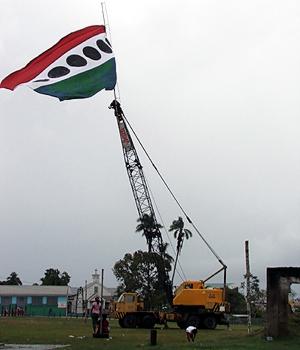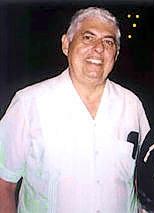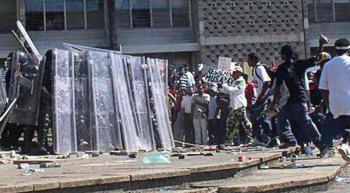 |
Orange Walk had a huge UDP flag hoised by a crane flying in the days leading up to the February 7th, 2008 elections.
|
 |
The first UDP Prime Minister, The Right Honorable Manuel Esquivel.
|
 |
Barrow famously stated in April 2005 that if necessary he would sanction civil disobedience among his supporters if it meant removing the PUP.
|
Belize got its Independence from Britain on September 21st, 1981, but Belize’s democracy has ruled in the land from before that. Other countries face civil unrest, wars, and death when in the process of electing their new leaders. As Belizeans, we have to be proud that our process is passionate and loud but still maintains a level of peace. Two political parties have been the stronghold of Central Government power, the People’s United Party (PUP) and the United Democratic Party (UDP). With a massive landslide during municipal elections in 2003 and now another grand victory for the UDP, we present a brief history of our ruling party in this week’s Our Belize Community.
In 1974, electoral opposition in Belize was weak; the ruling People’s United Party (PUP) had never lost a legislative election since its founding. The main opposition parties included the National Independence Party (NIP) and the People’s Development Movement (PDM), led respectively by Phillip Goldson and Dean Lindo. Representatives of both parties, together with a new Liberal Party led by Manuel Esquivel, met to consider joining forces to fight the PUP electorally.
The three parties fused into the new United Democratic Party (UDP) on September 27th, 1973, in time for general elections called for October 1974. A field of eighteen candidates were selected for the party’s bid and the party managed to win six seats and came within a combined eighteen votes of winning three more. Dean Lindo was subsequently named Leader, and Joseph Andrews of Cayo, Deputy Leader.
The UDP won municipal votes in 1974 and 1977 and gained seats in 1975 and 1978, with their only setback coming with the defection of an area representative to the PUP. It was considered only a matter of time before the UDP formed a government. However, their 1979 bid failed; in the November 21st elections the UDP won only five seats and party leader Lindo lost his to newcomer Said Musa (PUP). During this period the UDP advocated a cautious position on the status of the Guatemalan claim and a conservative view of economic policy.
In the early 1980s, the UDP suffered from internal maneuvering against new leader Theodore Aranda, a Garifuna from Dangriga. Aranda often claimed that Belize City elements were attempting to stall his leadership, a view refuted by other political observers. Nevertheless, it seemed the UDP had lost some of its original fervor. Even with their cautious position on the Guatemalan claim, the UDP put up only token resistance to the controversial Heads of Agreement designed to settle the Guatemalan claim in March 1981. Coupled with its position that independence be delayed to coincide with the resolution of the claim did not sit well with some parts of the electorate. Nevertheless, the UDP retained three towns in elections of December 1981.
In late 1982, Aranda was removed as head of the party and opposition leader, replaced by Belize City Representative Curl Thompson. At a January 1983, convention to settle the leadership of the party, college lecturer and UDP Senator Manuel Esquivel defeated popular former leader Goldson. Recovered from its dissension and benefiting from the unpopularity of the PUP government then in power, the UDP won Belize City Council elections in December of 1983 to set up a general elections showdown in 1984. It was in 1983 that Dean Barrow entered the political arena as a candidate for Belize City Council elections, which he won as part of a nine-man slate.
Riding on the shoulders of popular sentiment and the blunders of the PUP, Esquivel led the UDP to a resounding victory in general elections of December 14th, 1984, securing 21 seats out of a possible 28 (the number having been upgraded from eighteen). Esquivel pursued a course of minimal government, choosing to concentrate on exports and luring foreign investment.
Barrow then participated in general elections of December 1984 as a candidate for the Queen’s Square electoral division against, ironically, former fellow Ralph Fonseca. Barrow defeated Fonseca handily and was nominated to Cabinet as Attorney General and Minister of Foreign Affairs in addition to being Prime Minister Manuel Esquivel’s deputy in the Government and the UDP from March of 1990.
The UDP, in preparing for general elections in 1989, boasted of “rescuing the economy” and turning around the fortunes of less fortunate Belizeans. They pointed to improvements in education, transport, tourism, industry, agriculture and social lifestyles. However, too much dependence on Taiwan and the United States and lack of party unity led to a PUP victory. With their intention to “Put Belizeans First,” the PUP won general elections of September 4th, 1989 by a tally of 15 seats to 13.
Esquivel became Leader of the Opposition for the second time and the UDP, while appearing to be stable outwardly, faced a series of events that nearly split the party in half. The UDP, in coalition with National Alliance for Belizean Rights (NABR), won general elections of June 30th, 1993 by 16 seats to 13 for the PUP. Manuel Esquivel was elected Prime Minister for a second time. Barrow won his third straight general election, over Juliet Soberanis, and returned to Cabinet in the posts he held from the previous administration in addition to Minister of National Security. His detractors called him “Minister of Everything” during this period because he appeared at most major functions on behalf of the UDP government. Notable about the UDP’s victory is that only 49% or so of Belizeans voted for them; it is the only time in Belizean political history that a party recorded a win in general elections without the majority of national voter support.
Early in the UDP’s second term in office, Guatemala revived its claim to Belize, stating that all territory south of the Sibun River was theirs and demanding a hearing in the International Court of Justice. The two countries would eventually begin another series of talks, although border incidents involving Guatemalans entering the country illegally and Belizean law enforcement continued.
The UDP, however, were able to make further improvements in several sectors of Belizean life, including the reduction of gang violence, the rise of tourism as a major industry, improvements in infrastructure and social development. However, Belizeans were dissatisfied with the country’s economic performance and the remoteness of its officials, including Esquivel. Opponents often scathingly commented that Deputy Prime Minister Dean Barrow was “Minister of Everything” due to his frequent appearances before the Belizean public. Charges of corruption and nepotism were frequently leveled against Ministers Salvador Fernandez, Hubert Elrington, Eduardo “Dito” Juan, Ruben Campos and Elodio Aragon. The PUP made significant strides in popularity, much as had happened with the previous UDP administration, and seemed poised to win in 1998, even as a discouraged UDP made valiant attempts to shore up its public image.
After the 1998 elections loss in which Barrow was one of only three representatives who retained a seat for the UDP, Barrow was elevated to Party Leader and Leader of the Opposition, replacing Manuel Esquivel in both positions. Barrow has presided over the smallest Oppositions (three and seven respectively) in the House of Representatives since 1974 and ever in the UDP’s history.The UDP lost the general elections of August 27th, 1998, winning only three seats. Party leader Dr. Manuel Esquivel lost his seat in Caribbean Shores division and immediately resigned.
The UDP established a radio station, WAVE Radio, at a compound on Fabers Road in Belize City late in 1998 before moving it to their headquarters off the Belchina Bridge sometime thereafter. After shutting down its main political organ the People’s Pulse due to unpaid bills, the UDP created the new Guardian newspaper to replace it, naming journalist Audrey Matura Tillett as editor. She was replaced by Herbert Panton and then by current editor John Avery. WAVE’s current general manager is Juliet Thimbriel (recently appointed Senator).
In the run up to general elections in 2003, the UDP stressed its willingness to learn from its mistakes in office. It fielded a slate of 29 candidates for the March 5th elections. In the last three months prior to the election, several scandals involving party “favoritism” in the ruling People’s United Party gave the UDP greater confidence. However, the electorate showed that they still did not fully trust them, and voted them in in only seven seats. Barrow was named to the post of Leader of the Opposition for the second time.
In January 2005, Belizeans engaged in protests against the PUP’s new budget, claiming it demanded too much from the people. UDP supporters demonstrated in front of the National Assembly building on January 14th and January 21st, and were behind the scenes encouraging union and student activists to continue taxing the energies of the PUP, making them weaker in the eyes of the people. Barrow famously stated in April 2005 that if necessary he would sanction civil disobedience among his supporters if it meant removing the PUP. Late in the year, the UDP began naming candidates for elections in 2008, then more than two and a half years away.
The UDP held its National Convention to elect party leaders in May 2006. Dean Barrow was re-approved Party Leader after his success in March 2006, despite claims he might step down in the weeks prior to the election. Elected as Deputy Leaders, Chairman and Deputy Chairman respectively, were Gaspar Vega, Erwin Contreras, Frank “Pawpa” Mena, and Doug Singh.
After former soldier Robert Garcia left his post as National Campaign Manager early in 2007, the UDP named Karim Berges, businessman and activist, to replace him. Elections held on February 7th, 2008, proved to be a great victory for the UDP, winning 25 out of the 31 available seats.
Dean Barrow was sworn in officially as the Prime Minister of Belize on Friday, February 8th, and on Monday he announced the members of his Cabinet. With five years given to run the country, Dean Barrow, The United Democratic Party and their representatives fought long and hard and were chosen by the Belizean public as the body to govern “Our Belize Community.”
On behalf of The San Pedro Sun, congratulations and good luck.

|





